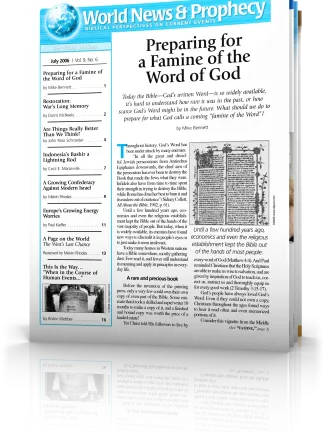Preparing for a Famine of the Word of God
Today the Bible—God’s written Word—is so widely available, it’s hard to understand how rare it was in the past, or how scarce God’s Word might be in the future. What should we do to prepare for what God calls a coming "famine of the Word"?
Throughout history, God's Word has been under attack by many enemies.
"In all the great and dreadful Jewish persecutions from Antiochus Epiphanes downwards, the chief aim of the persecutors has ever been to destroy the Book that made the Jews what they were. Infidels also have from time to time spent their strength in trying to destroy the Bible, while Rome has done her best to burn it and its readers out of existence" (Sidney Collett, All About the Bible, 1962, p. 61).
Until a few hundred years ago, economics and even the religious establishment kept the Bible out of the hands of the vast majority of people. But today, when it is widely available, its enemies have found new ways to discredit it in people's eyes or to just make it seem irrelevant.
Today many homes in Western nations have a Bible somewhere, mostly gathering dust. Few read it, and fewer still understand its meaning and apply its principles in everyday life.
A rare and precious book
Before the invention of the printing press, only a very few could own their own copy of even part of the Bible. Some estimate that it took a skilled and rapid writer 10 months to make a copy of it, and a finished and bound copy was worth the price of a landed estate!
Yet Christ told His followers to live by every word of God (Matthew 4:4). And Paul reminded Christians that the Holy Scriptures are able to make us wise to salvation, and are given by inspiration of God to teach us, correct us, instruct us and thoroughly equip us for every good work (2 Timothy 3:15-17).
God's people have always loved God's Word. Even if they could not own a copy, Christians throughout the ages found ways to hear it read often and even memorized portions of it.
Consider this vignette from the Middle Ages. Many believe that Peter Waldo was converted about 1160, and translated the Scriptures into French to spread the good news to all who would hear him. This led to persecution, as described in Foxe's Book of Martyrs:
"Soon the churchmen in the area, who would not explain the Scripture to the people, ordered Waldo to stop his work or face excommunication. Although Waldo ignored their orders, they persecuted his followers so badly that they were all forced to leave… So perfect were they in their knowledge of Scripture that unlettered country men were able to recite the entire book of Job by heart. Others knew the whole New Testament."
During those times, because of the scarcity of Bibles and the imminent danger to both the Bible and the person carrying one, it seems potential ministers had to memorize a large amount of Scripture, besides being able to explain it.
The struggle continued through the centuries. Consider that when William Tyndale made his English translation of the Bible, it had to be smuggled into England in bales of cloth or barrels of merchandise. The bishop of London tried to gather up all the copies in his area and publicly burned them. Tyndale himself was kidnapped from Antwerp, tied to a stake, strangled and burned in 1536.
It's hard, in this time when Bibles are so widely available, to imagine what it was like through most of history, but even today Bibles are hard to come by or even dangerous to possess in some nations, where conversion to Christianity can be punishable by death.
Prophesied famine of God's Word
Considering the proliferation of Bibles in hundreds of languages today—it remains the world's most translated, best selling and most freely given book—the warning in Amos 8:11 is surprising.
In the context of the time of the end marked by heavenly signs (Amos 8:9), Amos quotes God foretelling a time of famine—a famine of His Word. "'Behold, the days are coming,' says the Lord G od , 'That I will send a famine on the land, not a famine of bread, nor a thirst for water, but of hearing the words of the LORD '" (Amos 8:11).
Why would this famine come? Because of stealing, injustice, oppression and other sins Amos records. And because the people hadn't listened to all the previous warnings, had not repented, had "put far off the day of doom" (Amos 6:3). The warning was to people who had not listened to God's Word.
In the time leading up to Amos' prophecy, God's words had been proclaimed through the preaching of Elijah, Elisha, Jonah, Joel and Hosea. Today we have all these as well as the rest of the Bible in printed form. God's ministers today also warn of the consequences of sins and the need for repentance. But today, as in Amos' day, so few listen.
Amos prophesied during a time of national prosperity, at least for the upper classes of the northern kingdom of Israel. After years of national decline, Jeroboam II seemed to have turned the nation's fortunes around. But not for long. Perhaps 30 years later Israel would fall to the Assyrians and be taken into captivity from which they have not yet returned.
God's long patience finally came to an end with ancient Israel, and will again with our modern world. When people ignore His message one too many times, He promises to remove that message, for a time. Isaiah echoes the thought: "Seek the LORD while He may be found, call upon Him while He is near" (Isaiah 55:6).
When will this famine of hearing the words of the Lord come? Apparently it starts before the work of the two witnesses who will proclaim God's words publicly for three and a half years immediately before Christ's return (Revelation 11:1-3). How long will it last? This is not stated.
Will it mean all Bibles will be rounded up and burned? This does not seem to be necessary, since just having Bibles around doesn't mean they are read, believed or understood. As Paul said, "How shall they believe in Him of whom they have not heard? And how shall they hear without a preacher? … So then faith comes by hearing, and hearing by the word of God" (Romans 10:14-15, 17, emphasis added). Amos also called it a famine of "hearing the words of the LORD."
So it does seem God's work of proclaiming His words through His ministers, as well as through the mass media, will be shut off, perhaps through economic downturns, persecution, governmental regulations or a combination of these and other factors.
So what happens when God's words are not readily available any more? Apparently some of those who rejected them previously will suddenly notice they are missing, and will conduct a fruitless search throughout the land (Amos 8:12-13). Isn't that typical of our human condition, to be unaware of what we really want and need until it's gone?
Preparing for the famine
So what can we do to prepare now for the famine of the Word prophesied to come?
Like Joseph back in ancient Egypt, we need to be preparing for the years of famine during the years of plenty. It starts with hearing God's words now, studying them, treasuring them and obeying them. God calls on all to repent of sin and to live by every word of God.
But it's not just about our own salvation. God is calling many now to help spread His Word. That's part of the mission He gave His Church, to preach His good news to the entire world (Matthew 24:14; 28:19-20).
"With the coming famine of God's Word in mind, His servants today should have the same urgent mind-set that Jesus Christ had in His human ministry. He told His disciples, 'I must work the works of Him who sent Me while it is day; the night is coming when no one can work'" (Bible Reading Program on Amos 8-9, www.ucg.org/brp).
God has given His Church a job to do—to spread understanding of His Word, to preach the gospel, to warn the world. And the foundation of that is to study the Bible and understand it ourselves—to prepare ourselves to serve and help those God is calling now and into the future. Let's do it while there is still time. WNP







